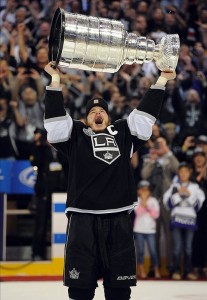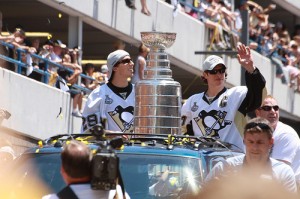As I was walking around the Prudential Center concourse before Game 5 between the Kings and Devils with my black #32 Jonathan Quick jersey on, one word rang clear over and over again.
“Go back to LA, bandwagon fans.”
“I bet they can’t even name who #27 is, bandwagoners.”
“The Kings don’t even have fans; they’re all on the bandwagon.”
The bandwagon concept is a familiar one for any successful team’s fan base. The term is usually thrown around as the playoffs approach or when a big acquisition is made, and it skyrockets as a team goes deeper into the playoffs or wins a championship.
http://youtu.be/lHZ4KB2OIXQ
What exactly is a bandwagon fan though? Why is there such a bad connotation with the term? And is it actually bad to be a bandwagon fan?
Here are a few definitions of a bandwagon or bandwagon fan:
Jump on the Bandwagon – idiom, to become involved in an activity which is successful so that you can get the advantages of it yourself (Free Dictionary)
Bandwagon – a party, cause, movement, etc., that by its mass appeal or strength readily attracts many followers. Example – After it became apparent that the incumbent would win, everyone decided to jump on the bandwagon. (Dictionary Reference)
Bandwagoner – In sports, someone who shamelessly cheers for a particular team not because he likes them or follows them faithfully, but only because that particular team is the “popular” choice or has been or is the top team in their specific sport recently. When that team which bandwagoners follow falls from grace, they gleefully jump on the next team’s bandwagon and cheer for that team. (Urban Dictionary)
A few things are clear from these definitions and explanations. First of all, a bandwagon fan is relatively new to the team or sport. Second, that team is currently successful, and appears like they will be successful for the foreseeable future. Third, the new fan is taking advantage of the fact that the team they follow will be successful for their own personal image, reputation, or gain.
Now please do me a favor before you continue on. Take a moment right now and think about when you became a fan of all of your favorite sports teams.
Here are mine with complete honesty:
Pittsburgh Penguins – December 1990 when my family moved to Pittsburgh (Cup Winner in ’91 and ’92)
Pittsburgh Pirates – April 1991 when baseball started after we moved (Division Winner in ’91 and ’92)
Pittsburgh Steelers – September 1991 after moving to Pittsburgh (Division Winner in ’92)
Penn State Football – Fall 2002 after I applied there (9-4, #15 in the country)
Oklahoma State Basketball – Spring 2004 after realizing Penn State Basketball was awful (30-3, Final 4 appearance)
Los Angeles Kings – February 2012 when I began writing for this site (Cup Winner in ’12)

Every single one of those teams was somewhat (or immensely) successful when I started following them, regardless of whether I followed them out of my own volition, geographical reasons, or career aspirations. By definition, I could be categorized as a bandwagon fan for all six when I started watching them. However, aside from the Kings this year, it would be foolish to categorize me as a bandwagon fan for any of the others by now. The Pens and Steelers have suffered their down years, the Pirates have suffered down decades, Oklahoma State has fallen off, and I won’t even get into Penn State right now. Regardless, I have stuck with all of those teams through thick and thin since starting as a bandwagon fan, which makes me a “true fan” of all of them now.
As you think about your fan history, consider that everyone has two points in time where they become a fan. The first is that so-called “bandwagon” point. Maybe it begins at birth with diehard parents. Maybe it begins when you move to a different city, meet someone special, or happen to turn on a game that you fall in love with. Maybe it begins with a winning streak, the #1 pick in the draft, or a championship. There is always a point where you start paying attention to a team/player/sport. The second point is when you turn from a bandwagon fan into a true fan. That point is hard to define, but can be thought of as the point when you want know more about the history of the team, thirst for knowledge about the game, or aren’t turned away by a few losses or a disappointing season.
Until this season and this experience with the Kings playoff run, I had despised the idea of bandwagon fans. As a Penguins fan who suffered through last place finishes, cheering for Rico Fata on the top line, and hoping that Kris Beech could one day turn into a Ron Francis type player (he didn’t), I had the erroneous belief that post-Crosby fans did not belong and were not worthy of celebrating future successes. I had the hypocritical attitude that everyone should be a hockey fan, but I did not want them to be beginners or ignorant to the team or game’s history.
Now, as my perspective has changed, I believe that bandwagon fans CAN be a good thing. The bandwagon is a gateway to fandom. It is where everyone enters, but most often, not everyone leaves. In Pittsburgh, drafting Crosby and winning a Stanley Cup in ’09 created a huge bandwagon effect. Some of those fans have since quit on the team, which has underachieved in the playoffs lately. Many, however, have turned into true fans that care just as much as anyone else. The same effect will likely be seen in Los Angeles. The city already has a stronger fan base than they are given credit for, and they will receive a long-lasting boost from this championship run. The bandwagon will one day thin out, but the leftovers will be new Kings fans, new hockey fans, and exactly what the NHL wants and needs.

The championship parade in LA drew approximately 250,000 people on Thursday. Hypothetically, if even a cynic said that 200,000 of those people were bandwagon fans, and even 1,000 of those bandwagon fans continued to follow the sport for the rest of their lives, isn’t that a gain for the Kings, the NHL, and hockey in general? That’s 1,000 new fans, regardless of how big the bandwagon was. That growth is what every hockey fan should root for.
It is intriguing that hockey fans frequently complain about the lack of NHL coverage and popularity but then will often shun bandwagon fans who could give the sport a boost. While I realize that this mentality isn’t only found in hockey, it makes a much bigger difference for the NHL as the least popular of the four major sports. In reality, it doesn’t matter when, why, or how you started following a team or player – it just matters that you do now and that you will continue to do so. If you can handle that task, you are a real fan in my book now. (But don’t turn your back on them like a fair-weather fan, which is a whole different issue.)
So to all of the new “bandwagon” Los Angeles Kings fans, myself included, forget the “bandwagon” label. Continue following the Kings and transition into a true fan. Learn about their history, continue supporting hockey, and continue supporting the Kings. I know that I will do the same (except when they play my Penguins).
To everyone else, I encourage you to help bandwagon fans turn into real fans rather than push them away. We all have the power to help this sport grow; let’s use it in a positive manner rather than to judge everyone else’s fandom.
As briefly discussed over twitter, my dislike for the “bandwagon” fan only extends to those that seem to want to remain ignorant of the game and the team. I will happily help on board fans from a bandwagon to, well, the wagon, I guess so long as they are willing to learn. I have issues tolerating the so-called fans who leave a tie game with 5 minutes left or jump up to get a beer as a two-on-one is developing drives me insane. Good insight on the post btw. bill
Great post Meesh. Bandwagon fans are necessary for the sport to grow. The same logic is based on the rise in Oklahoma City with the NBA finals. I can only hope that this type of fanatic growth starts to apply for all teams/sports. There really isn’t a negative to the ‘bandwagon’ idea, except for those ‘true fans’ who feel they are worthy of rooting for that team.